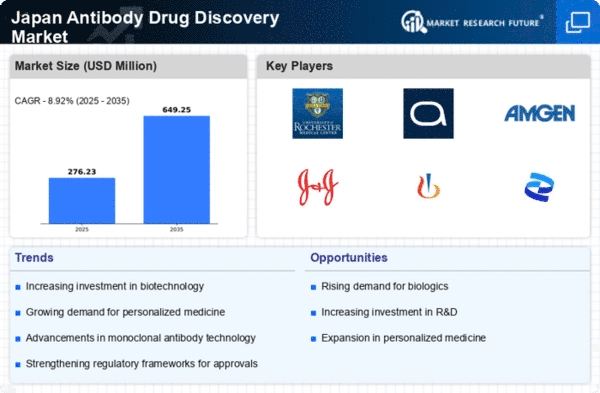Growing Aging Population
Japan's aging population is a critical driver of the antibody drug-discovery market. With over 28% of the population aged 65 and older, there is an increasing demand for effective treatments for age-related diseases, including various cancers and neurodegenerative disorders. This demographic shift is prompting pharmaceutical companies to focus on developing antibodies that can address the specific health challenges faced by older adults. In 2025, the market is projected to expand significantly, with estimates suggesting a growth rate of around 8% annually. The need for innovative therapies tailored to the aging population is likely to stimulate research and development efforts within the antibody drug-discovery market. As healthcare providers seek to improve the quality of life for elderly patients, the emphasis on targeted and effective treatments will continue to drive market dynamics.
Advancements in Biotechnology
Technological advancements in biotechnology are significantly influencing the antibody drug-discovery market. Innovations such as CRISPR gene editing, high-throughput screening, and artificial intelligence are streamlining the drug discovery process, making it faster and more cost-effective. In recent years, Japan has invested heavily in biotechnology research, with funding exceeding $1 billion in 2025 alone. These advancements not only enhance the efficiency of antibody development but also improve the accuracy of targeting specific disease pathways. As a result, the antibody drug-discovery market is likely to benefit from a more robust pipeline of novel therapeutics, which could lead to increased competition and a wider array of treatment options for patients. The integration of cutting-edge technologies is expected to play a pivotal role in shaping the future landscape of the market.
Regulatory Support for Biologics
The regulatory environment in Japan is becoming increasingly supportive of biologics, which is positively impacting the antibody drug-discovery market. Recent reforms have streamlined the approval process for new biologic therapies, reducing the time and cost associated with bringing new drugs to market. In 2025, the Japanese government is expected to allocate additional resources to expedite the review of innovative therapies, particularly those targeting unmet medical needs. This regulatory support not only encourages investment in research and development but also fosters collaboration between pharmaceutical companies and regulatory bodies. As a result, the antibody drug-discovery market is likely to see a rise in the number of approved therapies, enhancing treatment options for patients and driving market growth. The proactive stance of regulators is crucial in maintaining Japan's position as a leader in biopharmaceutical innovation.
Investment in Research and Development
Investment in research and development (R&D) is a fundamental driver of the antibody drug-discovery market. Pharmaceutical companies are increasingly allocating substantial resources to R&D initiatives, with expenditures reaching approximately $2.5 billion in 2025. This focus on innovation is essential for developing new antibody-based therapies that can address complex diseases. The collaboration between private companies and public research institutions is fostering a conducive environment for breakthroughs in antibody discovery. Furthermore, government initiatives aimed at promoting biopharmaceutical research are likely to enhance funding opportunities for innovative projects. As a result, the antibody drug-discovery market is expected to benefit from a steady influx of novel therapies, which could lead to improved patient outcomes and a more competitive landscape. The commitment to R&D is crucial for sustaining growth in this dynamic market.
Increasing Demand for Targeted Therapies
the antibody drug-discovery market is experiencing a notable surge in demand for targeted therapies. This trend is largely driven by the growing prevalence of chronic diseases, such as cancer and autoimmune disorders, which require more precise treatment options. In 2025, the market is projected to reach approximately $3 billion, reflecting a compound annual growth rate (CAGR) of around 10% over the next five years. As healthcare providers and patients alike seek more effective and less invasive treatment modalities, the focus on monoclonal antibodies and other targeted therapies is likely to intensify. This shift not only enhances patient outcomes but also aligns with the broader goals of the healthcare system in Japan, which emphasizes personalized and efficient care. Consequently, the antibody drug-discovery market is poised for substantial growth as it adapts to these evolving healthcare needs.
















